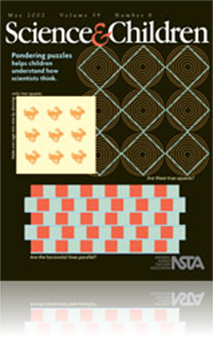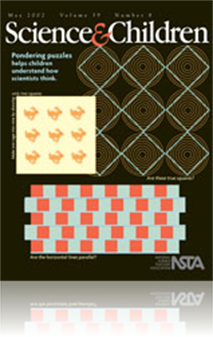All Resources
Journal Article
Science Sampler: Familiar toys and abstract ideas
In this article, learn how to use some toys to teach students various abstract science concepts, such as ratios, percentages, and conservation of mass....
Journal Article
It's Alive: Students observe air-water interface samples rich with organisms
After collaboration with a university researcher, students found that the air-water interface was a thin biofilm on the surface of still water composed of a rich variety of living microorganisms. Samples exposed to day-night intervals and in total da...
Journal Article
What lives in the pond? Did frogs hop from another pond to ours? How do tadpoles get into the pond? And Could our pond be polluted? These questions were addressed in a professional development program that takes advantage of a school pond to teach en...
Journal Article
Rolling on the River: Professional mentors motivate students to learn environmental science
Students participate in an interdisciplinary project, Research@the.River.com. By collaborating with their professional mentors while working in the field, students learned environmental science curricula through discussion and interaction. Most impor...
Journal Article
The Idea Bank provides tips and techniques for creative teaching, in about 1,000 words. This month’s Idea Bank features a unique activity using halved apples, oranges, and onions as the "specimens" that teaches necessary dissection skills to prepa...
Journal Article
Writing a Statement of Teaching Philosophy
Writing a statement of teaching philosophy is a cornerstone of reflective and scholarly practice in teaching and learning. A strategic set of practical and philosophical guidelines, including a definition, elements, and structure of a statement of te...
Journal Article
Weekly Reports: Student Reflections on Learning
Weekly reports, a structured journal form of formative assessment, allow instructors to receive information from the students, to address students’ difficulties in a timely manner, and to alter their instruction based on the students’ needs. In a...
Journal Article
Wacky Machines: A unit on simple machines gets a new twist with old junk
The next community yard sale might be a repository of old, quirky items that are just the things to get students thinking about simple machines. By introducing some "wacky machines" at lab stations as mystery objects, teachers can watch students' min...
Journal Article
Science and Children’s editor shares thoughts regarding the current issue, and also the neighborhood excitement of a bird building a nest on the front porch. ...
Journal Article
Research and Teaching: Practical Considerations for Assessing Inquiry-Based Instruction
Research shows that inquiry learning promotes achievement and positive student attitudes toward science. One obstacle to implementing inquiry learning, however, is the development and use of appropriate assessments. This difficulty can be eased by ta...
Journal Article
An aquatic insect aquarium is a great tool for teaching students about life cycles, food webs, environmental niches, and adaptations to pond life. Complete directions for setting up the aquarium are provided, along with several ideas for investigatio...
Journal Article
Students enrolled in an Enhanced Bioscience Education (EBE) program maintained two documents: a group notebook to record observations made in the bioscience laboratory and a personal journal to note reactions to the literature read in the humanities ...
Journal Article
What Do Amphibians Have to Offer? Students monitor and map amphibians in local pond habitats
Scientists have expressed concern over amphibian decline. In a cooperative project with a university and a local high school, students monitor and map amphibians in local pond habitats and try to distinguish population fluctuations from actual declin...
Journal Article
At its heart, science is fundamentally about solving questions, or puzzles. Puzzles are those things to which the solution is unknown—now. Each generation of scientists tackles an array of problems, solving some and leaving many more to future gene...
Journal Article
Role-playing is an effective summative activity that aids student learning and integrates science information and concepts. The authors describe the use of a role-play activity. Senate hearings centered around the theme of global climate change, and ...
Journal Article
Science Sampler: The Iron (Fe) Scientist
Can pennies be used to teach science? Learn how in this article using the science lesson, or Iron (Fe) scientist competition. as the author called it, The lesson was created for pre-service teachers but can be easily adapted to students....
Journal Article
As science educators we are faced with some issues associated with our choice of words and their implications for learning outcomes. Because the “hidden” curriculum influences student learning, it is important that terms such as theory and conce...
Journal Article
Hands on the Land, a new initiative to promote the use of public lands for environment-based education, consists of a national network of field classrooms designed to link students, teachers, and parents to national public lands. Each education site ...
Journal Article
Help slow the growth of landfills with strategies found in this month's insert provided by Keep America Beautiful, Inc. ...
Journal Article
While most schools offer different types of camps, a growing number are offering summer science camps. This provides a way for children to enjoy the summer while learning science at the same time. One school looked to Camp Invention® for its summer ...
Journal Article
Summing It Up: Teaching summary writing to enhance science learning
Students can learn to recognize information that is most important to the author of a science article or book by using repeated references and generalization. This strategy—designed for college reading classes but adapted for secondary school scien...
Journal Article
Science Sampler: Exploring Floating Concrete and Beam Design
These construction activities increase students' awareness of math and science careers, especially in the area of engineering....
Journal Article
Reconstructing the Geologic Timeline: Adding a constructivist slant to a classic activity
The geologic timeline activity is revisited, adding a constructivist slant. This project provides evidence that time-honored activities still have a place in today's science classes. ...
Journal Article
Science Adventures at the Local Museum
To promote science learning outside the traditional classroom and encourage preservice teachers to use hands-on science, a local university and museum partner to promote informal science education....
Journal Article
Tech Trek: Personal digital assistants
The personal digital assistant (PDA) is rapidly becoming an essential classroom tool. This article provides an overview of some of the science related programs available to classroom teachers....
Journal Article
What Does It Mean To Be Standards-Based? Examining Standards and initiatives in the classroom
The standards-based teacher is patient, working to create a classroom climate that supports a need to know and explain on the part of the students. This article features a brief history of the benchmarks and Standards and provides a checklist of crit...
Journal Article
Project FLORA: Flora Love Our Revegetation Areas
A small school district in southwestern Texas comes together to protect its own backyard. In this project students collected native seed, built a greenhouse to propagate native plants from this seed, learned to identify disturbed areas within the par...
Journal Article
Toying with Motion: Exploring Newton's laws of motion with student activities
Students are motivated to understand and apply Newton’s laws of motion by playing with toys. This activity allows students to demonstrate their understanding of the laws of motion and requires far more than just memorization. ...
Journal Article
The Coast Guard Comes to Class
The United States Coast Guard offers many programs and resources without cost to teachers and their students. The author describes his visit to a sixth-grade classroom, where he demonstrates an oil spill and explains how pollution affects the marine ...
Journal Article
Scope on the Skies: April's planetary line up
This column focuses on astronomy throughout the year. Sit back and enjoy the month of April as the five brightest planets are arranged over the western horizon at sunset....










